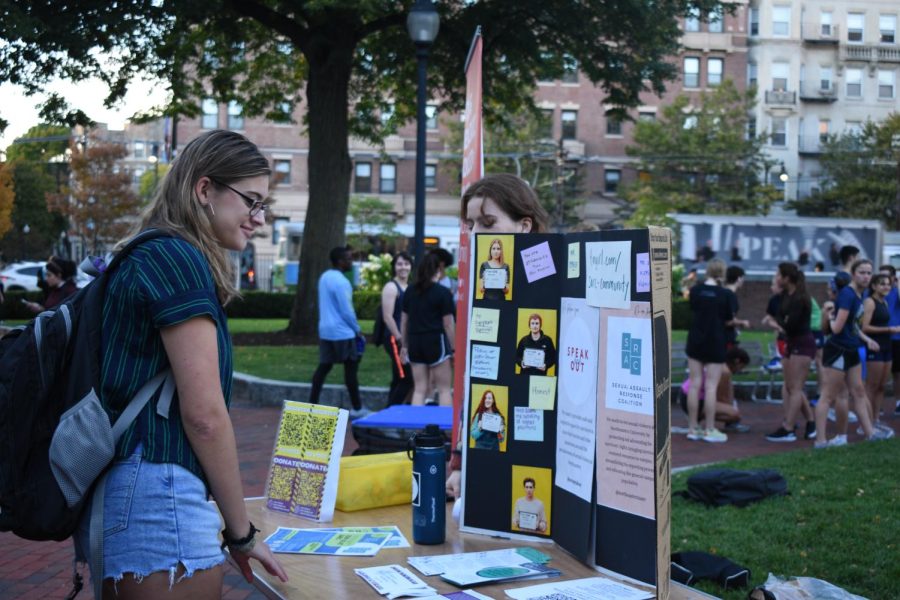Students rally for abortion access, trans rights on YDSA’s Day of Action
Student organizations, including NEU Speakout, were present at the Oct. 6 rally for reproductive rights and trans rights. The rally on Northeastern’s campus was part of the national YDSA’s Day of Student Action for Reproductive Justice.
October 11, 2022
Northeastern students led a rally for reproductive justice and trans rights last week in the wake of continued conversations about the overturning of Roe v. Wade.
The event, led by Northeastern’s Young Democratic Socialists of America, or YDSA, in partnership with the Sexual Assault Response Coalition, or SARC, and the Graduate Employees of Northeastern University, or GENU, was a part of the national YDSA’s Oct. 6 Day of Student Action for Reprodutive Justice.
“The only answer is us, right? Which is why I’m so glad that these three groups, the Young Democratic Socialists of America at Northeastern, the Sexual Assault Response Coalition and the Graduate Students Union here at Northeastern are taking this fight up,” said Eve Seitchik, a socialist organizer from Somerville, in their speech. “And it’s why I’m in this fight.”
The rally took place on Krentzman Quad and featured two speakers, in addition to tabling from YDSA, SARC and GENU. The tables held QR codes directing students to donate to the National Network of Abortion Funds and register to vote.
Seitchik discussed how students have the power to start and maintain a movement if they are willing to organize. They encouraged those in attendance to have difficult conversations with their families and peers and spread the word about similar events. They said they have been an activist for a long time, even running for city council in Somerville, but said the real way to make an impact is to invite other people to join the conversation.
“You’ll be shocked at what you can achieve with just a few of your friends,” Seitchik said. “When you start to sort of learn from history, [you] learn that the power is in your hands, which is not something that the powerful want you to believe.”
Seitchik also emphasized how marginalized communities, including people of color and transgender and non-binary people, are often overlooked in the conversation about abortion access. Affluent, cisgender, white women, they said, have always had access to abortion care, even when abortion is restricted.
“This is a racialized issue. People who are transgender or non-white have always been at the brunt of the violence that the state brings when it threatens reproductive rights,” Seitchik said. “The abortion action that we are fighting for is free and without apology and without stigma and together we’re going to win it.”
Sky Baur-Rowe, a fifth-year psychology major and non-binary person, spoke to the crowd about the overturning of Roe v. Wade and led a series of chants.
The crowd participated in a call-and-response type chant affirming that “trans rights are human rights” and “reproductive rights are human rights.” Baur-Rowe also led a song in which participants sang the lyrics “the union makes us strong.”
“Further eroding of democracy has come into fruition,” Baur-Rowe said. “The three branches of government have simultaneously failed the people [they] swore to protect.”
They added that though Gov. Charlie Baker has taken steps to protect abortion in Massachusetts, activists have an obligation to fight for the same protections in other states where trigger bans and other restrictions have taken effect. Baur-Rowe also spoke about the importance of inclusive advocacy when it comes to reproductive justice.
“Reproductive rights [aren’t] a women’s issue,” Baur-Rowe said. “It is a trans man’s issue, an intersex issue, a non-binary issue. We are seeing the eradication of trans healthcare before our very eyes.”
Amanda Bell, a fourth-year data science and behavioral neuroscience combined major, spoke with The News after the rally about the event’s creation. Much of the planning took place at YDSA meetings, she said, with the main focus being how they could organize students quickly and effectively. The group decided to hold the event outside to maximize engagement, and they reached out to potential speakers. Bell said YDSA would have liked to have more speakers, but it was too short notice.
“I think the main idea of the event was a sort of day of solidarity,” Bell said. “The idea was a whole bunch of other groups, like schools across the country, would be doing something like this, maybe not a rally, but it could be tabling events, maybe some students took off a day of classes at other schools, maybe something like that to learn more about abortion rights and women’s rights and education.”
Students passing through the quad stopped by tables, donated and registered to vote. Representatives from the different student organizations shared information about reproductive care and sexual assault resources and how to get further involved in the cause.
Simultaneously, students in other parts of the country participated in their own rallies and walkouts. According to the national YDSA, “students and workers across over 50 campuses in 30 states” demonstrated Oct. 6 in support of the national cause. In Boston, Harvard Law School and the Massachusetts Institute of Technology both held a demonstration that day, in solidarity with the movement.
Seitchik echoed Bell’s message about solidarity in their speech, calling upon the crowd to commit to taking action with the support of those around them.
“When I think about being a trans feminine person speaking at a rally for reproductive rights, for me, it’s all about solidarity,” Seitchik said. “It’s about being here in solidarity with my sisters, with my brothers, with my siblings, my fellow trans people, and we have to face this almost unprecedented assault in the history of our country.”







